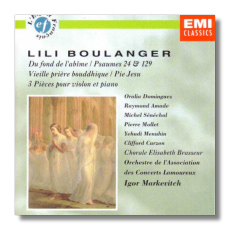
The Internet's Premier Classical Music Source
Related Links
- Latest Reviews
- More Reviews
-
By Composer
-
Collections
DVD & Blu-ray
Books
Concert Reviews
Articles/Interviews
Software
Audio
Search Amazon
Recommended Links
Site News
 CD Review
CD Review
Lili Boulanger

- Du fond de l'abime
- Psaume 24
- Psaume 129
- Vielle prière bouddhique
- Pie Jesu
- 3 Pieces pour violon et piano (Nocturne, Cortege, D'un matin de printemps)
Oralia Dominguez, contralto; Raymond Amade, tenor; Pierre Mollet, baritone
Michel Senechal, tenor
Alain Fauquer, soprano; Jean-Jacques Grunenwald, organ
Yehudi Menuhin, violin; Clifford Curzon, piano
Chorale Elisabeth Brasseur
Orchestre de l'Association des Concerts Lamoureaux/Igor Markevitch
EMI Classics CDM 64281
This CD transfers older recordings. The first five works premièred on an Everest LP in the late 1950s. If you've been around that long (and I certainly have), you might very well know these performances. They have seldom left the Schwann. The sound is as bass-heavy and dull as the original Everest LP. The performances are adequate, with the typically ugly French brass sound as their only real drawback.
Many composers have died young: Mozart and Gershwin, to name only two. Yet, if we think of career length, Mozart and Gershwin had at least fifteen great years. Boulanger had only five, and the shortness of that career adds to the poignance of her death. There just isn't all that much work to allow us to make extravagant claims for her. Her main influence is late Debussy (compare with the latter's Trois Ballades de François Villon of 1910 and Le Martyre de Saint Sebastien), with his stripped-down harmonies of fourths and fifths, but she quickly struck out on her own. The liner notes point out how much of her work anticipates Honegger's "oratorio" vein of Le Roi David and Judith. What there is of Boulanger is of very high quality indeed. For me, however, she wrote her masterpiece on her deathbed: the Pie Jesu for boy treble, organ, string quartet, and harp. Not only is it beautiful in its own right, it looks forward to Messiaen twenty-five years before the fact. I find her strongest suit a chant-like, hypnotic quality, repeating a few very strong motives to powerful effect, as in the Pie Jesu, Psaume 129, and the Vielle prière bouddhique. Boulanger was a composer mainly of promise - I would easily say of great promise. Her death robbed us all.
The three pieces for violin and piano come from EMI in the 60s. The recorded sound quality improves upon the Everest by leaps. The Nocturne from 1910 shows her not quite free of Debussy of the Prélude to the Afternoon of a Faun, and the Cortege (1914) exhibits traces lingering from Debussy's piano music. In D'un matin de printemps, however, written in her final year, we begin to see something non-Debussyan - a nervous energy creeping in, far from her characteristic mode of quiet intensity. Whether this would have come to anything more, we can't know - one more reason to regret her loss. Menuhin and Curzon do well to capture the various shades of her musical thinking in lively readings.
Copyright © 1996, Steve Schwartz


















